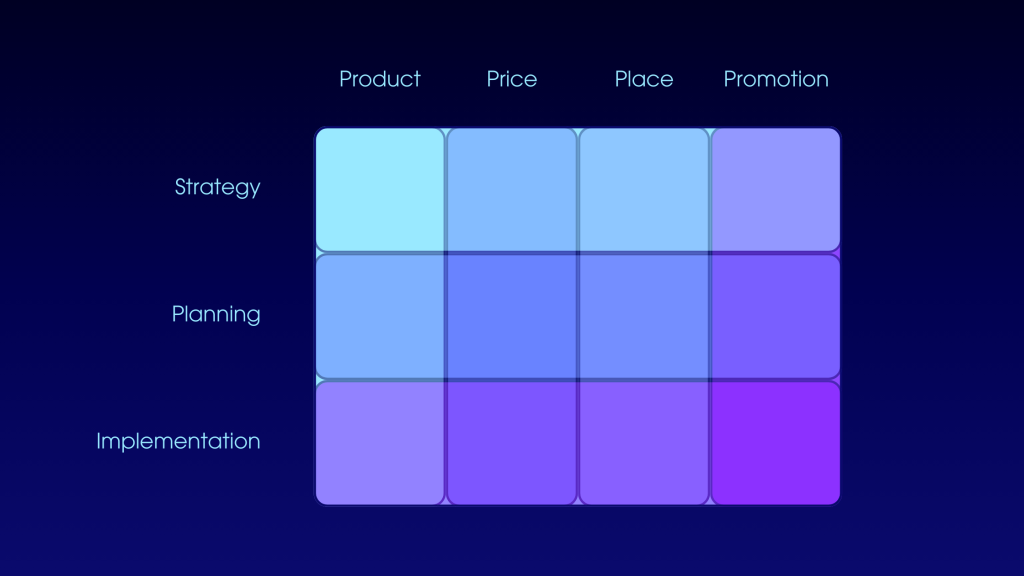You’re reading this article for 2 reasons:
- You want to improve your business’s marketing.
- To make that happen, you’re deciding between an in-house employee or an external partner like a marketing agency.
Both options have their places – but, if you want to drive leads quickly, outsourcing your marketing function to an agency is often the best choice. Read on to find out exactly why that is (and what ‘marketing’ actually includes).
What Is Your Marketing Function?
“Marketing is the arts-and-crafts department.” “I’ve never needed marketing. All our customers just find us.” “Marketing is fluffy. I’ll just hire a salesperson instead.”
Those are some of the things we regularly hear business owners say. And here’s the problem: those beliefs come from a misunderstanding of marketing. So, before we explain why outsourcing your marketing function can be a good idea, let’s get clear on what marketing is.
At its core, marketing is the process of taking your products and services to market. It’s represented by the 4 Ps marketing mix:
- informing your products and services, which includes messaging and packaging
- pricing your products and services
- identifying places to distribute your products and services, such as via your website, through e-commerce platforms like Amazon, or at a brick-and-mortar store
- promoting your products and services through channels like organic search, networking, Google Ads, billboards, cold calling, and so on.
If you didn’t have distribution channels, prices, or any kind of promotion, you wouldn’t have a business. The marketing function is literally essential to the existence of any organisation.
Of course, your marketing function and your marketing department are 2 very different things. For example, if you’re a small business owner, you likely set prices yourself – which means you, not your marketing team, own the pricing component of marketing. (At many larger organisations, pricing is owned by the finance department.)
That’s why many business owners think that marketing is just promotion. It gets even more complex because some promotional channels – like networking and cold calling – are often owned by business development or sales teams, not marketing teams.
So, if you’re thinking about outsourcing your marketing function, work out what parts you’d like to keep in-house. You can use the below matrix as a rough guide. Keep in mind that you can get even more granular than the 12-way split we’ve illustrated. For example, you might choose to outsource the strategy, planning and implementation for all your one-to-many promotional channels (Facebook, Google Ads, and so on), but keep your one-to-one promotional channels (networking, cold calling, and so on) owned by your in-house business development manager.

Benefits of Outsourcing Your Marketing
Now we’re clear on what marketing is, we can unpack why outsourcing it is often a good idea. For the purposes of this article, we’ll focus on the benefits of outsourcing to a full-service marketing agency like us.
1. Strategic Growth Partner
Think about how you view outsourcing. Are you looking for someone to just do what an in-house marketer could do, but cheaper/faster/better? Or do you want a growth partner – an experienced, capable agency with extensive business experience and a unique philosophy?
A good marketing agency will have a strong understanding of business strategy and brand-building. They can help you identify what levers need to be pulled to improve net new revenue. They’ll also be able to build out internal RevOps infrastructure (like your CRM), identify resource gaps, and even train in-house staff. That’s a lot more value than most employees can add to your business.
2. Faster Implementation
An employee’s start date and an agency’s start date are 2 very different things. A marketing employee will often take a month or more to understand your infrastructure, your brand, and their role. They’ll then typically have a ramp-up period of 2–5 months before they deliver a positive ROI.
An agency, on the other hand, is like a well-oiled machine. It has clear processes for onboarding clients and gathering information; it’s also a full organisation with specialists across different disciplines, which means it’s more efficient than a single, generalist employee.
Your agency can start delivering results as soon as you’ve given them the information they need. That’s especially valuable if you have a complex, high-priority project – like a new website – that needs to get off the ground quickly.
3. Clear Deliverables and Costs
If you hired a generalist marketer with around 4 years of experience, a reasonable salary would be $75,000 per year. You’ll also need to account for onboarding (an average of $23,860), training (an average of $7,200 per year for SMBs), worker’s compensation insurance premiums (around $1,000 in Queensland), software (expect around $150 per week for a reasonable, single-licence marketing stack), and paid time off (annual leave, sick leave, and unproductive hours – around 3 hours per day for the average professional).
That ‘cheap’ employee is actually very expensive – even if you’ve made a good hiring call and won’t have to fire them in 6 months. An agency, on the other hand, will charge you the monthly rate specified in your contract and nothing more. They’ll also have clear deliverables and KPIs, which should be tied to your sales pipeline and/or net new revenue, such as X high-intent leads per month.
4. Cross-Business Insights
Most agencies don’t work with just one business. Their client portfolios incorporate multiple brands – often across different market segments, industries, and business sizes. That gives them access to proprietary sets of data that in-house marketers don’t have access to.
For example, many of our current clients are mid-sized, service-based businesses in high-complexity industries like construction, financial services, and IT. When we do things like draft messaging, design LinkedIn Ads campaigns, or build service pages for one client, we’ll get insights that can be applied to the rest of the brands we work with. It’s a constant feedback loop that means our marketing just gets better and better over time.
5. Easier Onboarding/Offboarding
We’ve already talked about how expensive onboarding an employee is. A 2022 report from HR platform Elmo Software found the average Australian business spends $23,860 and 40 days filling a vacant position. Finding an agency, on the other hand, is straightforward: work out what you want to outsource, understand what traits you want in a partner, collect a shortlist of 3–8 agencies, and then send those companies RFPs. It’s a process that shouldn’t take any more than 2 weeks.
It’s equally easy to offboard an agency. If you get to the end of your contract and don’t want to work with them anymore, don’t renew. It’s that simple. And, if they don’t meet their contractual obligations, you can terminate them even earlier.
Employees are more complex. It’s extremely difficult to fire someone for cause in Australia – emotional stress aside, you’ll need an employment lawyer’s assistance to do it safely. The other way to get rid of an underperforming marketer is to make their role redundant, which still has legal implications and may come with a hefty redundancy payout if they’ve been employed for over a year.
To Hire or to Contract?
There’s no one-size-fits-all answer to the ‘agency versus employee’ question. Sometimes, it is better to hire, especially if you need someone in-house to coordinate different marketing vendors. Often, though, an agency makes more sense – especially for small businesses that want an outcome like more leads.












